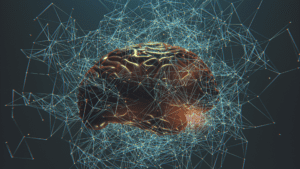🎧 Audio Version
Introduction
Cognitive distortions, while subtle, have a profound impact on our perceptions, emotions, and behaviors. These systematic biases in our thinking can shape our worldview, often leading us astray from reality. This guide delves deep into the neuroscience underpinning these distortions, providing a comprehensive understanding of their origins, manifestations, and strategies for overcoming them.
What are Cognitive Distortions?
Cognitive distortions are irrational, biased thoughts or beliefs that distort an individual’s perception of reality. They are systematic patterns of deviation from the norm or rationality in judgment, leading to potential emotional distress and skewed perceptions. These distortions act as mental “filters,” often reinforcing negative thoughts or emotions, and influencing our reactions to various life situations.
Causes and Development of Cognitive Distortions

At the core of cognitive distortions lies the intricate workings of the human brain. Several factors contribute to the development and reinforcement of these distorted thought patterns:
- Neurological Factors: Certain areas of the brain, such as the amygdala, responsible for emotional processing, can sometimes overreact to negative stimuli, leading to distorted perceptions. On the other hand, the prefrontal cortex, our rational thinking center, might underreact, allowing these distortions to prevail.
- Neural Pathways: The brain’s neuroplasticity, its ability to form and reinforce neural pathways based on experiences, plays a significant role. Repeated negative experiences or thoughts can strengthen the neural pathways associated with cognitive distortions, making them more automatic over time.
- Early Life Experiences: Traumatic events, upbringing, and societal influences can shape our thought patterns from a young age, embedding these distortions deep within our neural networks.
Types of Cognitive Distortions
Delving into the various cognitive distortions, we find:
- All-or-Nothing Thinking: Viewing situations in black and white, without recognizing the gray areas. This can lead to perfectionism and feelings of inadequacy.
- Overgeneralization: Drawing broad conclusions from a single event or data point. This can result in a pervasive sense of doom and pessimism.
- Mental Filter: Focusing exclusively on negative aspects, ignoring the positive. This can lead to a skewed perception of reality, where only the negatives are magnified.
- Disqualifying the Positive: Rejecting positive experiences by rationalizing them as flukes. This can erode self-esteem and confidence.
- Jumping to Conclusions: Making negative predictions without concrete evidence. This can lead to unnecessary anxiety and worry.
- Magnification and Minimization: Exaggerating negatives and downplaying positives. This distortion can lead to feelings of guilt and inferiority.
- Emotional Reasoning: Believing that because you feel a certain way, it must be true. This can lead to decisions based on emotions rather than facts.
- Should Statements: Holding oneself to a rigid set of unrealistic expectations. This can lead to feelings of guilt and resentment.
- Labeling and Mislabeling: Assigning harsh labels to oneself or others based on limited information. This can damage self-esteem and relationships.
- Personalization: Taking undue responsibility for external events. This can lead to unnecessary guilt and self-blame.
Implications of Cognitive Distortions
The repercussions of cognitive distortions are vast:
- Mental Health: They can exacerbate conditions like depression and anxiety. These distortions can create a negative feedback loop, where distorted thoughts lead to negative emotions, which then reinforce the distorted thoughts.
- Relationships: They can lead to misunderstandings, conflicts, and strained bonds. Cognitive distortions can cause individuals to misinterpret the actions and intentions of others, leading to unnecessary conflicts and tensions.
- Workplace: They can hinder decision-making, collaboration, and leadership, affecting career trajectories. For instance, a person with a distortion like “personalization” might take constructive feedback personally, leading to conflicts and reduced productivity.
Identifying Cognitive Distortions
Recognition as the Foundation:
The journey to address cognitive distortions begins with their recognition. These biases, often operating below our conscious radar, subtly shape our perceptions and reactions. Cultivating self-awareness is pivotal in this process, allowing individuals to pinpoint and understand these distortions.
Techniques for Identification:
- Journaling: Regularly documenting thoughts and feelings can illuminate recurring negative or biased patterns, enabling individuals to identify specific distortions.
- Seeking Feedback: Sometimes, an external perspective is invaluable. Trusted peers or mentors can provide insights into distorted thought patterns that might not be immediately evident.
- Mindfulness and Meditation: Engaging in mindfulness practices fosters a heightened sense of self-awareness. This heightened state allows individuals to catch and recognize distortions as they arise.
Challenging Cognitive Distortions
Once identified, it’s essential to challenge these distortions to prevent them from influencing behavior and emotions negatively.
Strategies for Challenging:
- Evidence Collection: For every distorted thought, pause and ask: “What’s the evidence for this belief? Is there evidence against it?” This analytical approach can help dismantle unfounded beliefs.
- Shifting Perspectives: Attempting to view a situation from another’s viewpoint can be illuminating. It helps discern if the distortion is a personal bias or if it holds true from multiple perspectives.
- Avoiding Absolutes: Distorted thoughts often deal in absolutes, like “always” or “never.” By challenging these and seeking more nuanced views, one can arrive at a more balanced understanding.
Reframing and Overcoming Cognitive Distortions
Reframing is about altering a negative or biased thought to reflect a more positive or neutral perspective. This shift can significantly impact emotional responses and overall well-being.
Techniques for Reframing:
- Positive Spin: Instead of succumbing to negative interpretations, one can choose to see the silver lining. For instance, rather than thinking, “I failed at this task,” one could consider, “This attempt didn’t work out, but it’s a learning opportunity.”
- Neutral Ground: If positive thinking feels forced, aiming for a neutral stance can be beneficial. For example, viewing a setback not as a failure but as “just one of many experiences” offers a balanced perspective.
- Questioning Assumptions: Cognitive distortions often arise from unverified beliefs. Actively questioning these and seeking evidence can lead to thoughts more grounded in reality.
Neuroscientific Brain-Based Coaching:
While traditional therapeutic methods have their merits, the innovative field of neuroscientific brain-based coaching delves deeper. This approach explores the neural mechanisms behind cognitive distortions, offering strategies to reshape these thought patterns at the neural level. By understanding how the brain forms and reinforces these patterns, individuals are better equipped to not just challenge but also reshape them. This method integrates the latest findings from neuroscience, offering a holistic approach to reframing.
Conclusion
The intricate relationship between the brain and cognitive distortions provides a profound understanding of human behavior and perception. While these distortions are deeply ingrained, they are not set in stone. Armed with the right tools, insights, and a deep understanding of the realm of neuroscience, individuals can effectively challenge and reshape these distortions. By leveraging innovative approaches, especially those grounded in neuroscience, individuals can not only pave the way for clearer thinking but also significantly enhance their overall mental well-being.
, , , , , , , , ,













